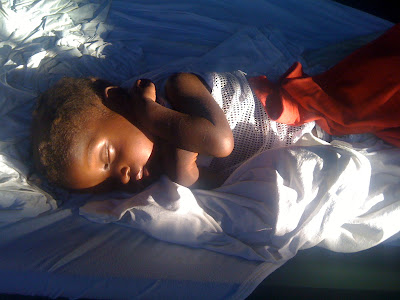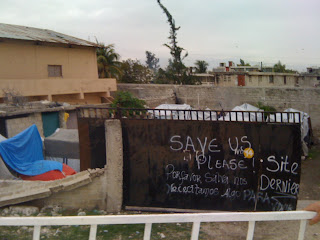
Alex, one of our truck medics, was thrown in jail this week. When I heard, my first thought was horror. Followed by a sudden guffawing laugh. Alex.
Alex is a 22 year old free spirit from Los Angeles, home schooled kid with 9 siblings -- including a few adopted Haitians. He came to Haiti after the earthquake to help however he could. He wanders the streets of the slums, speaking a mixture of Creole, French and English, wearing a hipster hat with a duct taped bill, cut off khakhi pants, skate boarder sneakers. When he removes his hat, his hair stands on end and askew, about three inches above his head, styled by fingers run restlessly through the strands. He is cool. Not intentionally, just incidentally. A humble cool. A brilliant young medical mind.
He hangs out on the top of our truck as we ride through the streets, occasionally twisting his foot into the metal bars in such a way that he can dangle off the roof suspended by just one leg. He and I have discussed the intelligence of this maneuver (or lack there of), and the accessibility of neurosurgeons (or lack there of), and the distance to the ground if he were to fall. He grins and shrugs. I keep my eye on him. I enjoy when he rides on the right side of the truck roof and I on the left. Because the left side of the truck overlooks the center of the street, while the right side of the truck gets slapped with tree branches and bushes and dangling mangoes growing on the side of the road. There is nothing more satisfying than watching Alex get slapped in the side of the head with a palm tree frond as we make our way through tree lined neighborhoods.
Alex, in his fearlessness, has ventured deeper into the slums than most of us might find comfortable. He is seen shaking hands and tapping fists with strangers, genuine yet casual smile on his face. We call him "the mayor"...a natural politician. And as mayor, he has had the most success tracking down people with orthopedic injuries. He knows how to activate the neighborhood grapevines. And in his ventures into the deeper labarynths, Alex has single handedly found at least four young women discharged from post-quake medical care with poorly healed femur fractures...who without resources, were left to lie on the floors of their homes with no hope of rehabilitation. He found them. And ultimately saved them...as they were returned to our hospital for curative surgery and a chance at a new life.
Alex rode the truck before I arrived in Haiti. So, on my first day in the slums, I was impressed by his popularity. In neighborhood after neighborhood, whether walking or riding, groups of children and young women call out "Alex, Alex!" as we pass. Our security guards mock him, calling out in high falsettos, "Alex! Oh, Alex..." Alex has seven wives in each neighborhood, one of our normally stoic and silent security guards advised me one day with a smile.
Alex likes to dangle by one braced leg off the roof of the truck, and will do so especially when the United Nations tank/truck vehicles drive past us. He enjoys the sudden startled looks on the faces under the blue helmets when he takes his pseudo-swan dive. Gives the poor fellas something to do, he says, as they drive around and around....which is what he's decided the folks at the UN do. They drive around and around in empty trucks. That is their mission in Haiti. Or so it appears, from the top of our truck.
Yet, he can be serious. It was Alex, along with our paramedic Chase and our nurse Morgan, who dragged an unconscious old man out of a drainage ditch full of human waste this week. The old man had been hit and run by a motorcycle. Open skull fracture, cominuted femur fracture....left for dead. And covered in sewage. Alex rescued him. And carried his lifeless body to our truck.
So, it was a bit of a wonder to hear that Alex was in jail. My first thought was, "Why?!!" My second, that I wished I had a cake mix and a file, because I think he'd appreciate the gift.
Turns out, Alex was asked to accompany one of the last remaining orphans from the Heartline Orphanage here in Haiti out to meet her new adoptive family in the United States. The tragedy of the earthquake has sped up adoption processes and facilitated a miraculous lifting of adoption beurocracy. (Alex himself notes that it took his family six years to complete the process of adopting his sister from Haiti.) Unfortunately, several American "missionaries" who chose to illicitly remove children from the country following the earthquake has led to caution on the part of the Haitian government in all subsequent legal adoptions. Now, all children leaving the country require a signature of the Prime Minister.
So, on the day of his departure, Alex was handed an official sealed packet of documents by the folks at the American embassy. Unfortunately, the embassy failed to include the document with the Prime Minister's signature. And, at the airport, with child in hand, documents were inspected, found to be lacking, and Alex was handcuffed and taken away....and charged with kidnapping.
After contemplating baking Alex a cake with a file, and realizing the ludicrous nature of his kidnapping charges, I came up with an ingenious plan. I imagined going to the streets of Citi Soleil and spreading the word of Alex's unjust imprisonment. I was certain, within the hour, I would have an angry hoard of residents en tow to help me storm the jail.
But before I could recruit my hoard, we were informed that Alex had been let go. The Consulate General of the US Embassy apparently went to the jail and negotiated Alex's release. Note, it was the US Embassy's paperwork error that got Alex thrown in jail to begin with. Which is why the comments of the Consulate General were incomprehensible to me. Apparently, the diplomat made something of a scene. He began yelling at the top of his voice, at Alex, in the jail. And bellowed something, to paraphrase, like the following:
"No wonder you were arrested. Look at how you're dressed! Do you think this is any way to dress to take an orphan out of the country?" He continued, "Look at your socks!! White socks? You should wear black socks if you want to represent yourself professionally." Then, finally, "And look at your hair! Do you call that an appropriate haircut?"
Alex, who came to Haiti with a backpack on his back, to serve the poor. No room in his bag for the apparently required tuxedo. Arrested, evidently, for wearing cotton socks and tennis shoes.
Let's be honest. What the Consulate General should have said was, "Look, I am a blow-hard, prejudiced, anal retentive beaurocrat who screwed up your paperwork, got you thrown unjustly into prison, and am now scapegoating you because I consider you powerless and naive enough to fear my ignorant rant. And by ranting, I remove attention from my own incompetent screw-up, and direct it, buffoon-like, in your direction. Do you fear me, politically powerless boy?"
Yes, Alex was freed from Haitian jail. And prejudiciously lambasted for his haircut. The beloved Alex of the slums, who spends his days volunteering in Haiti, pulling dying men from roadside sewers and crippled children from the ghetto. Chided by the second most powerful American in Haiti, because he failed to wear black socks to the airport.
Mr. Consulate General...you should be ashamed.
Thankfully, there is a thing called karma. So, the next morning, a freed Alex tried again. He gathered his paperwork, his small orphan girl, and made his way again to the airport. He still wore white socks and finger combed hair standing straight up atop his head. And this time, had the proper signatures. He boarded a private plane donated to fly 60 legitimately adopted orphans, and their escorts, to new homes in the United States. And delivered his precious package to her new loving home in America.
Turns out, the plane was donated by Sean Penn, actor and human activist. Who himself seems to have lost his comb a number of years ago... Mayor Alex (who'd never heard of Sean Penn, by the way), sat next to the actor on the way to the USA. He told Mr. Penn his story.
"You met Sean Penn?" I asked, when he'd returned.
"Yeah, he was pretty cool."
"Did you tell him what you were doing down here?" I asked.
"Yeah, I told him," Alex said, with his typical mellow humility. He shrugged. "He said I am a hero."
Yes, young Alex. You are.

















